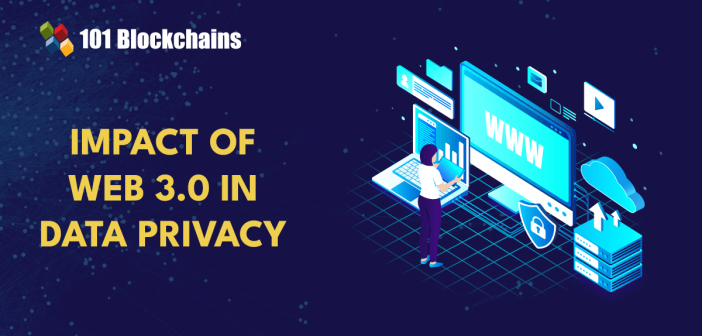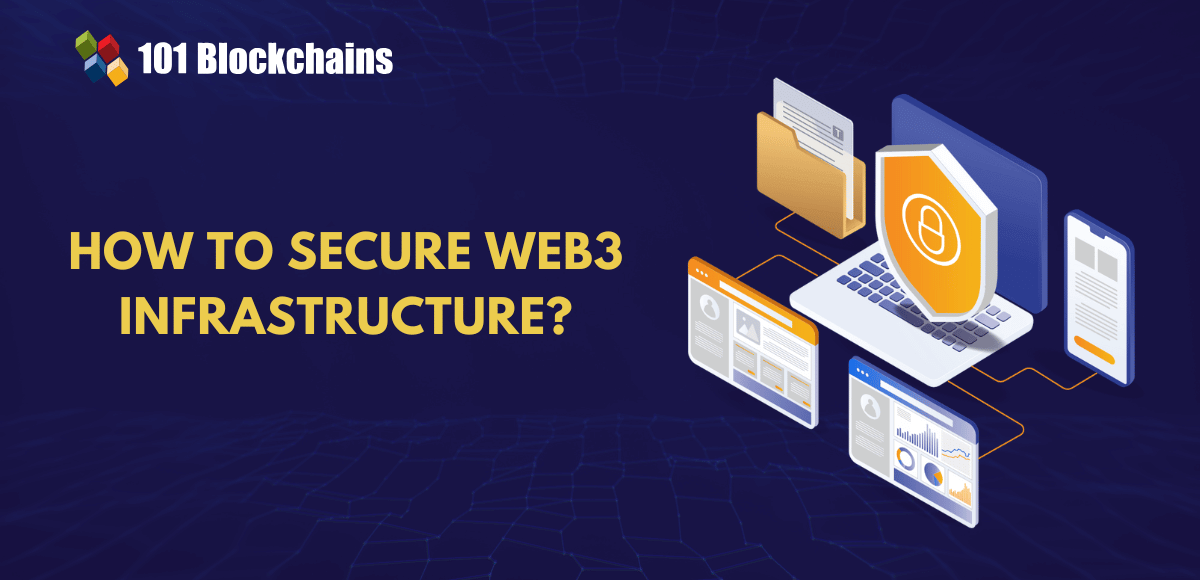Learn how blockchain truly works, master key definitions, and uncover what makes smart contracts so "smart." Dive into the fundamentals, gain valuable insights, and start your blockchain journey today!

- Web3
James Howell
- on October 27, 2023
The Promising Impact of Web 3.0 in Data Privacy
Privacy and safety are the most important concerns for users in the digital world. While safety ensures that nobody can break into your home, privacy implies that your neighbor doesn’t peek into your bedroom. Do you really have privacy for your data online? The debate around web3 impact in data privacy draws the limelight towards big tech corporations.
For example, social media platforms such as Facebook, Instagram, and Twitter offer interactive playgrounds for publishing and sharing content. The content on social media networks includes text, images, video, and audio files uploaded by users. Let us assume that you have shared an image of the celebrations in your family on the occasion of your marriage anniversary. You upload the image through ‘your’ account on a specific social media site. At the same time, it is important to think about whether the account is really yours.
The data generated, utilized, and shared across social media and other digital platforms in the existing web2 framework stays under centralized control. You might think about the possible setbacks for data privacy due to centralization. By agreeing to store your data on the centralized servers of an organization, you give them the power to monitor and use your data at their will.
On top of it, the need for web3 data privacy is also visible in the unhinged power of tech giants over user data. As a matter of fact, a social media platform could delete the images of your anniversary celebrations, and you could do nothing about it. How will web3 change the approaches to control data ownership and data privacy? Let us find the answer with a review of the different ways in which web3 could ensure data privacy.
Understanding Web 3.0
The most obvious requirement for evaluating the impact of web3 on data privacy would be the definition of web3. You can find a better impression of web3 impact in data privacy by understanding the principles underlying the foundations of web3. Web 3.0 is the semantic and decentralized version of the internet, which could understand natural language communication and empower users.
One of the most common definitions of web3 paints it as a user-friendly, decentralized, and smarter version of the internet. How does the definition of web3 establish a connection with user privacy? Let us reflect further on the question with a review of the previous versions of the web.
Web 1.0, or the first version of the internet known to human users, was static in nature. It was the ‘read-only’ version where websites featured static content such as important information. The necessity of data privacy impact assessment became clearly evident with the introduction of Web 2.0 or the ‘read-write’ web.
The second generation of the web introduced social media, dynamic websites, and e-commerce websites. Most important of all, web2 introduced the concept of user-generated content, which marked a significant improvement over web1. The design of web2 facilitated collaboration and provided a more interactive approach to web experiences.
The biggest problem with web2 emerged in the form of the service providers. Tech giants and any service provider in web2 have the advantage of taking user data into their control. What more could you expect when you store your data in their centralized servers? For example, Facebook or Instagram could delete your photos, citing a violation of community standards. On top of it, centralization also led to security risks, which created doubts regarding the feasibility of web2.
The concerns regarding web3 impact in data privacy led to the notion of creating a version of the web that offers more security and privacy. Web3 utilizes technologies such as blockchain, AI, and IoT to ensure that users have a seamless, interactive, decentralized, and private web experience. Imagine accessing the internet without revealing your personal details for signing into a digital service platform. You can dive deeper into web3 fundamentals to explore its potential to serve a more user-friendly and decentralized internet with better privacy.
Excited to know about various key aspects of web3 technology? Check here Web3 Fundamentals Presentation now!
Problems with Data Privacy
Before exploring the influence of web3 on ensuring data privacy, it is important to unravel the existing data privacy concerns. How is web3 security better than the existing tech platforms? In the existing web2 infrastructure, tech giants command unlimited power through control over personal data of users.
As a matter of fact, web2 has boosted notions about the lack of privacy on the internet. For example, users have to accept the ‘terms and conditions’ of a website to access their services. Starting from social media to professional networking services and basic services such as email, you need to accept the terms and conditions of the service provider.
You must have come across the statement ‘online privacy is a myth’ on many occasions, and it holds true for most cases. The answers to “How does web3 protect privacy?” also draw attention to the problems with the continuously evolving digital marketing ecosystem. For instance, tracking cookies and collecting user data is essential for digital marketing practices. However, businesses have to rely on personal data of users to achieve success in digital marketing.
People have gradually started noticing the problems with entrusting big tech companies with their personal data. Scandals such as the Cambridge Analytica fiasco and alleged involvement of Facebook have strengthened the distrust of users in web2. As a matter of fact, Facebook reported a drop of 26% in its shares within one day in 2022. The debates about web3 security and privacy also point out that web2 has powerful regulations for safeguarding user privacy.
However, data privacy regulations such as CCPA and GDPR have pitfalls, which do not allow a comprehensive layer of protection. Even if enforcement of GDPR has led to multiple large fines, big tech companies do not experience any trouble in paying the fines. In a way, the cost of non-compliance for web2 companies is monetary in nature without any legal consequences.
Want to understand the critical data privacy issues for blockchain solutions? Enroll now in the Blockchain And Data Privacy Masterclass
How Will Web3 Ensure User Privacy?
The concerns regarding user privacy in web3 imply that the internet needs a lot of work. It is time to introduce fundamental changes in the way the web works to encourage healthier relationships between companies and users. The review of web3 impact in data privacy shows the problems which have been troubling users. For example, data ownership and security are some of the concerns which affect user privacy in web2. Let us take a look at the different ways in which web3 could enhance user privacy.
-
Data Ownership
The foremost highlight among the beneficial implications of web3 points to data ownership. Web3 utilizes blockchain technology to optimize user experience by entrusting users with control over their data. The web3 impact through blockchain technology ensures that the internet would run on a peer-to-peer network of nodes.
On top of it, the publicly accessible distributed ledgers with blockchain could ensure better transparency for users. You could check important data records and their verification within a few simple steps. As a result, users could gain ownership of their data, which includes social media posts, online activity, and contacts.
The element of data ownership in web3 leads to explicit user content. As a result, web3 data privacy would focus on ensuring that no platform could access or share user data without their permission. In addition, users could access their data across different platforms without the need for re-uploading or re-posting the data. Therefore, the improvements in data ownership and control could have positive implications on user privacy for future web3 users.
-
Incentives in Web3 Ecosystem
Some of the popular blockchain networks have been experimenting with possibility of using incentives to ensure data privacy. Blockchain involves a peer-to-peer network, where all participants maintaining the ledger and powering the network plays a vital role. You can find answers to “How does web3 protect privacy?” with examples of blockchains which use incentives for network participants.
The incentives are rewards for the participants to act in a fair and transparent manner. On the other hand, blockchain networks could also impose penalties on violators according to the pre-defined roles. You could think of DAOs or Decentralized Autonomous Organizations as one of the major examples of implementing such incentives. The decentralized governance of DAOs ensures that all the community members follow the rules for safeguarding user privacy.
Curious to develop an in-depth understanding of web3 application architecture? Enroll Now in Web3 Application Development Course!
-
Data Sharing Will Not End
The most common concern in a data privacy impact assessment right now points to the unauthorized sharing of user data. Do you know that tech giants sell the personal information of their users to advertisers? The critics of web3 might have assumed that web3 would end data sharing completely and your data would stay with you. On the contrary, web3 would allow users to decide how and when to share their data.
Users would also know the duration for which they would share their data and how it would be put to use. For example, users should know about the third-party companies to which a platform sells their data. On top of it, users would have complete control over revoking shared data. If a user doesn’t like how their data is implemented or does not want to share their data with a specific company, they could revoke the access privileges.
-
Improved Cybersecurity
The effect of web3 on data privacy also draws attention to the security benefits of blockchain technology. Blockchain has been designed to offer immutability and cryptographic security. Data breaches affect millions of people worldwide every year, and blockchain could help in reducing the threat of data breaches.
The importance of web3 security is also visible in the advantages of public-private key cryptography. Data on web3 remains permanent and transparent while existing in the public domain. Furthermore, the innovative developments with introduction of technologies like AI could improve cybersecurity stance of web3.
-
Safety for Digital Identities
The applications of AI in web3 could also boost identity verification procedures, which serve as a valuable addition to data privacy. For example, integration of AI with popular KYC technologies could help companies in employing automated regulatory search engines.
The search engines could bolster web3 data privacy with functionalities such as real-time analysis of digital footprints, filtering sensitive keywords, and conducting background research. The volume of online data continues expanding at an alarming rate, thereby offering opportunities for digital identity theft. Losses due to digital identity theft amounted to almost $52 billion in the United States only. Therefore, web3 can offer a prominent solution to identity theft, thereby safeguarding user privacy.
-
Smart Contracts and Data Ownership
Blockchain could ensure that users have verifiable ownership of their data. However, implementation of smart contracts could also explain “How does web3 protect privacy?” as they could encode the ownership of assets on smart contracts. For example, NFTs are the best examples of using smart contracts to prove ownership of digital and virtual assets. In addition, the immutability of smart contracts helps web3 users with a streamlined approach toward virtual asset ownership.
Challenges for Data Privacy in Web3
The adoption of web3 to ensure better data privacy would also have to face multiple challenges. You can understand the web3 impact in data privacy and seek innovative solutions for implementing web3 in practice. However, web3 technologies are expensive and require higher initial capital investments. In addition, the role of governments and regulatory agencies in the implementation of web3 could also create conflicts between legal frameworks and privacy rights.
Start your journey to becoming an expert in Web3 security skills with Web3 Security Expert Career Path
Bottom Line
Web3 is a massive milestone in the journey of advancement of the internet. It serves as a secure, decentralized, and more privacy-centric version of the Internet with the support of other technologies. You can leverage the benefits of web3 security and privacy on the foundations of blockchain technology, AI, and smart contracts.
As the world gears up for the web3 revolution, the concerns of data privacy have gained significant traction. Companies that want to ride on the popularity of web3 must also review the challenges of adopting web3. For example, the concerns of massive initial costs for web3 technologies and conflicts with legal frameworks can affect web3 adoption. Learn more about web3 fundamentals and explore the advantages of web3 for data privacy and security now.
*Disclaimer: The article should not be taken as, and is not intended to provide any investment advice. Claims made in this article do not constitute investment advice and should not be taken as such. 101 Blockchains shall not be responsible for any loss sustained by any person who relies on this article. Do your own research!







